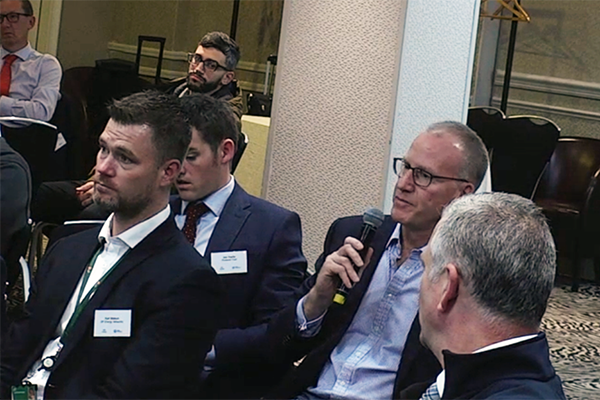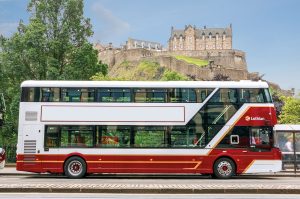Kleanbus, a UK-based company aiming to cost-effectively decarbonise the country’s bus fleet, has bolstered its advisory board with the addition of three low-emission mobility experts, as it scales up to commercial roll-out later this year.
Jamie Wilson joins to advise on legacy vehicle engineering, concepts and technical development. Jamie has spent the last five years with the world’s largest manufacturer of double decker buses, Alexander Dennis Limited (ADL), currently as Head of Concepts & Advanced Engineering. An experienced engineering manager with strong commercial acumen, he previously spent more than four years in engineering roles at FMC Technologies, following almost nine years with ADL, responsible for global single deck bus body engineering across three manufacturing plants, including the introduction of hybrid vehicle technology. Jamie holds a MBA in Business Administration and Management from Glasgow Caledonian University.
Kleanbus also welcomes Rachel Chambers to the team, bringing a wealth of experience in electric vehicles, manufacturing and technology/distribution to advise on business development and partnerships. Rachel has several years’ experience in developing and delivering large strategic innovation projects, bringing together industrial partners, central government, suppliers, academia and RTOs across the UK. Rachel is the COO of Driving the Electric Revolution Centre (DERIC) North East, where she works with industry to accelerate the Power Electronics, Machines and Drives (PEMD) supply chain through facilitating collaboration across multiple sectors to accelerate prototyping, scale up and development, with the vision to make the UK globally recognised as the centre of excellence in PEMD. Rachel holds a BA in Law from the University of Teesside.
Finally, Simon Buckley joins the Kleanbus advisory board to bring further technical expertise in repowering and low-emission mobility. Simon is currently Manager of Zero-Emission Mobility at the Knowledge Transfer Network (KTN), with ten years’ experience in the development of electric and hybrid vehicle technology and energy storage systems. An evangelist on charging infrastructure and connected and autonomous vehicles, Simon has worked on numerous APC, Innovate and H2020 programmes. Previously Simon spent almost four years with Magtec/Magnetic Systems Technology, most recently as Head of Programmes. Simon also spent a year as Programme Manager for Magtec’s bus and truck repower activities.
Founded last year, Kleanbus offers a unique solution to eliminating diesel pollution from the UK’s bus fleet, repowering diesel models by replacing the engine with a zero-emission fully electric powertrain, at a fifth of the cost and in a fraction of the time of buying a new electric bus. With its proprietary technology, Kleanbus offers a fast and efficient way towards zero-emissions, making buses cleaner, quieter, more comfortable, and more valuable assets for operators. Changes to the Bus Service Operators Grant (BSOG) announced at the beginning of this month further incentivise the move to a zero-emission bus fleet, and strengthen the case for repowering as an extremely viable option towards this goal.
Joe Tighe, Co-Founder & CEO of Kleanbus comments: “Jamie, Rachel and Simon bring several decades combined experience in low-emission mobility and the bus sector, which will help us enormously as we move forward in deploying our solutions at pace and scale. It’s a real endorsement of our mission here at Kleanbus that we can attract such leading industry authorities, and I look forward to working with each of them as we get to the next level and beyond.”
The forthcoming commercial roll-out of Kleanbus’s unique proprietary technology comes as authorities and operators continue to work towards ambitious net zero targets and addressing the mounting air quality crisis facing the UK’s towns and cities. The UK government has set a target of introducing at least 4,000 British-built zero-emission buses by 2024 through its national Bus Back Better strategy. In London, where 9,300 of the UK’s 35,000-strong bus fleet operates, TfL committed to procuring only zero-emission buses from September 2021 – and achieving a 100 per cent zero-emission bus fleet by 2034 – saving more than four million tonnes of carbon. As of September 2021, TfL had 550 zero-emission buses on the road, with 400 more on order.
ENDS





